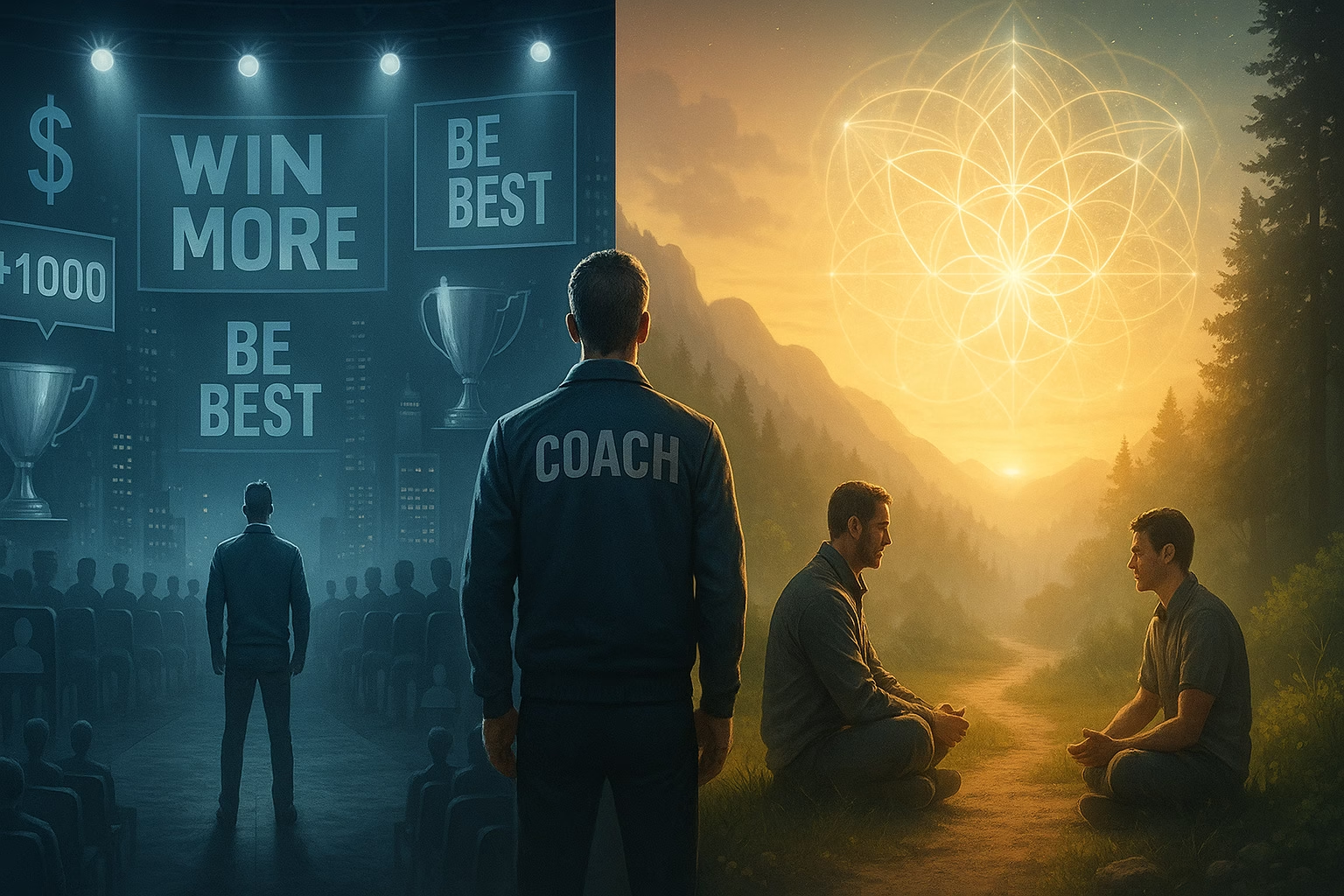PODCAST: The Fractal Shift
The coaching and personal growth industry is navigating a structural transition, moving away from models centered on ego-driven performance and toward methodologies rooted in conscious, purpose-driven transformation. This evolution reflects a growing societal awareness that maximizing external success, if divorced from authentic internal meaning, results in systemic fragility and personal dissatisfaction. The shift is mandated by the increasing complexity of modern life, requiring an integral approach where individual change is understood as a necessary prerequisite for collective health, a concept mirrored by the principle of self-similarity inherent in the fractal structure.
II. The Philosophical Depth: The Ego, The Self, and The Fractal Imperative
1.1. The Architecture of the Egoic Self: A Necessary Fiction
Contemporary analysis of the self begins with a philosophical and neuroscientific understanding of the ego. The ego is not merely a psychological flaw but a critical, foundational cognitive utility. It is often described in neuroscientific literature as a “self-model” or a “useful Cartesian fiction”.1 This interpretation suggests the ego is ultimately an ultimately false representation of a simple and enduring substance, yet it serves a robust and ubiquitous cognitive function.1
The primary evolutionary and functional purpose of the ego is its role as a binding mechanism.1 It integrates and unifies cognitive processing across hierarchical levels and domains, thereby creating the essential impression of a stable, unchanging entity—the ‘I’—to which experiences and representations are consistently bound.1 This impression of a centered “knower” is crucial for normal waking consciousness and provides the necessary foundation for subjectivity.2
While a balanced ego is required for self-assurance, resilience, and conviction 3, an inflated or rigidly fixed ego becomes detrimental to growth. Ego-driven behavior often manifests as a desire for admiration, a need for control, and a reluctance to accept criticism, viewing feedback as a personal attack rather than a learning opportunity.3 Leaders who operate from this fixed state may stop learning and growing, which, despite potentially yielding short-term victories, undermines long-term influence and trust.4
Traditional, performance-focused coaching often relied heavily on dianoia, or the acquisition of didactic knowledge and rote skills, to drive leadership effectiveness.5 This prescriptive methodology inadvertently reinforces the rigid self-model by adding layers of technique and optimization to the existing ego structure. The core problem lies in optimizing a binding mechanism (the egoic fiction) rather than transcending its limitations. Sustainable transformation, particularly in complex adaptive environments, requires epinoia, or the capacity to perceive with depth and process in-the-moment experiences to deepen self-awareness and manage ego needs.5 A reliance on prescriptive, performance-based coaching thus risks exacerbating the client’s reliance on the very system (the rigid ego) that must be loosened for deep, integrated transformation to occur.
1.2. The Mirage of Ego-Driven Success: The Commodification of Self
The ego-centered coaching model played a key role in the commodification of self.6 In this framework, self-definition and the quality of inner experience become mediated by market relations. Individuals may define who they are through the consumption of goods and images, identifying with acquired traits, or by reorganizing their personal lives into strategies designed for economic gain, such as “personal branding”.6
This prevailing cultural narrative often utilizes the simplistic “if you want, you can” mentality.7 This approach, however, often overlooks the complexity of structural constraints and the essential human need for collective care.7 By relentlessly pushing individual optimization, this model can unintentionally exacerbate feelings of inadequacy and struggle, particularly when external circumstances or systemic oppression impede purely individualistic efforts.7
The inevitable consequence of optimizing a self-fiction is a lack of existential mooring. Individuals who achieve the highest metrics of external success—the wealth, status, and physical optimization—frequently report profound internal alienation, describing a “dull ache” or a feeling of being completely alone despite appearing successful on paper.9 This phenomenon decisively illustrates that the optimal performance of the egoic self-model does not translate into authentic, fulfilling existence.
1.3. The Fractal Metaphor: Individual Change as Systemic Evolution
The paradigm shift is fundamentally driven by the recognition of the fractal imperative: the patterns of health and dysfunction are self-similar across scales, mandating that individual transformation (micro) must co-emerge with collective evolution (macro).
This comprehensive view finds its structure in Integral Theory, particularly Ken Wilber’s AQAL (All Quadrants All Levels) model.10 Integral Theory asserts that any complete account of reality must integrate four dimensions: the individual-subjective (Interior), the individual-objective (Exterior), the collective-intersubjective (Lower Left), and the collective-interobjective (Lower Right).12 While traditional coaching often focused narrowly on the individual-subjective mindset or objective behavior, conscious transformation demands simultaneous change across all four quadrants.13
The emerging focus is on the collective-intersubjective realm—the shared values, common meanings, and collective worldviews.11 Carl Jung’s concept of the collective unconscious highlights this subterranean influence, comprising inherited presuppositions that profoundly influence individual consciousness.15 Transformation at the individual level (e.g., a CEO shifting their leadership identity) must co-emerge with a change in the organizational culture (the collective system) to be successful and sustainable.17 This focus on fostering psychological safety and shared meaning is essential for moving organizations toward higher developmental structures, such as a “teal organization” where collective and self-leadership co-exist.17
II. The Psychological Insight: Mechanisms of Identity-Level Transformation
The conscious paradigm understands that sustainable change is not achieved through willpower but through deep, non-effortful, identity-level shifts. This process is grounded in psychological flexibility and the profound loosening of the rigid self-structure.
2.1. The Gateway of Ego Dissolution and Psychological Flexibility
The mechanism that facilitates loosening psychological rigidity is ego dissolution (ED), defined as the diminished sense of self or the reduction in self-referential awareness.18 While this experience is often associated with the use of 5-HT2A receptor agonists 18, mild versions are experienced in everyday “flow states,” where an individual is fully absorbed in an attention-engaging activity.20
ED functions therapeutically by increasing psychological flexibility.21 This flexibility is the capacity to adapt to new situations, be present for a broader range of stimuli, and align behavior with core personal values.21 ED allows the self-model to become malleable, which is crucial for psychological growth.20 The process can be challenging; if the individual resists the fragmentation and tries to “fight for control” to maintain their threatened identity, the experience can become overwhelming and terrifying.21
This highlights a profound psychological tension: ego-driven models are predicated on control and effort (e.g., self-control to counteract ego depletion).22 However, the key to deep transformation (ED) is often the surrender of control and the conscious tolerance of uncertainty.23 Therefore, conscious coaching must cultivate an environment of non-judgmental awareness 24 to maximize the client’s ability to surrender the illusion of stability and maximize growth potential.20
Neuroscientific findings support the therapeutic utility of this experience. Reduced precision of neuronal signaling in hierarchical predictive processes, observed during states of ED, facilitates a reorientation of attention and enables the brain to entertain “unfamiliar hypotheses” underlying the model of self.25 This mechanism provides a pathway for therapeutic belief revision and has been linked to potential “resets” in neural networks implicated in depression.26
2.2. From Behavior Modification to Identity Transformation
Older coaching models prioritized behavior modification, relying on techniques like the GROW model, informational strategies, and persuasion for achieving results.27 While useful for initiating change, such models struggle with the long-term maintenance of new behaviors.29
Sustainable transformation cannot be maintained solely through the effortful recruitment of executive function (EF) or willpower, as EF is prone to error and “ego depletion”.30 The “Maintain IT model” of behavior science posits that enduring change requires the underlying cognitive processes to become less effortful, ideally shifting toward nonconscious, automatic processing.30
This non-effortful maintenance is achieved through a centered identity transformation.30 When a new identity is deeply integrated (e.g., “I am an environmentally conscious leader” rather than “I must perform environmentally conscious tasks”), the associated behaviors are expressed automatically. This transformation requires deep introspection to identify and release outdated beliefs and past conditioning that no longer serve the evolving self.31 Self-awareness—the capacity to impartially acknowledge and comprehend one’s emotions, values, and strengths—plays the key role in initiating this profound, identity-level change.32 The philosophical pursuit of purpose and alignment with core values is thus revealed to be a fundamental neurocognitive requirement for long-term behavioral sustainability.30
III. The Practical Guidance: The Ascent of Conscious and Integral Coaching
The shift from the ego-centric model to the conscious model requires new frameworks and a redefinition of the coach’s role.
3.1. Differentiating the Paradigms: Developmental vs. Performance
The modern coaching landscape is delineated by methodological intent:
- Performance Coaching is reactive, focusing on immediate skill gaps and short-term fixes, often emphasizing superficial changes in “doing”.35
- Developmental or Integral Coaching is proactive, designed to build future capabilities by challenging limiting beliefs and facilitating sustainable, identity-level shifts.23 It focuses on the leader’s “essence”—clear values and authentic, consistent behavior—rather than polished executive presence.36
Integral Coaching, drawing on advanced human development theories 37, supports the client in discovering their own internal authority and understanding why change is necessary, rather than simply instructing how to change.23 The challenge in the human performance industry is often not a lack of technical knowledge (systems) but a lack of true consciousness among practitioners.38 The art of connecting and educating, which defines conscious coaching, outweighs a rigid, systems-based approach for managing complex human behavior.38
The following table summarizes the structural evolution in the coaching methodology:
Table 1: The Evolutionary Pivot: From Ego-Centered Performance to Conscious Transformation
Dimension | Old Paradigm (Ego-Centered/Performance) | New Paradigm (Conscious/Purpose-Driven) |
Locus of Identity | External validation, social roles, accumulation (Commodified Self) 6 | Internal authority, core values, authentic essence 23 |
Goal of Coaching | Short-term wins, skill mastery, behavioral fixes (Didactic learning/Dianoia) 5 | Identity-level shifts, sustainable growth, deep self-awareness (Epinoia/Identity Transformation) 5 |
View of the Coach | Expert, Guru, Authority, Trainer/Mentor 39 | Mirror, Facilitator, Process Expert, Partner (“Not Knowing” Stance) 40 |
View of Ego | Driver of strength, asset to be managed, source of ambition 3 | Useful fiction, binding mechanism to be transcended/integrated; source of rigidity 1 |
Transformation Mechanism | Effortful Executive Function (Willpower/Control) 30 | Psychological Flexibility (Loosened Boundaries/Belief Revision) 21 |
Scope of Impact | Individual optimization, professional advancement (Me-centered) 5 | Collective well-being, systemic change, organizational culture (Other-centered) 7 |
3.2. Principles of Conscious Practice: Facilitation and Presence
In conscious coaching, the role of the practitioner shifts from being a subject matter expert to being a process expert—a facilitator and a mirror.39 The coach provides structure and a neutral platform, compelling the client to surface their own ideas, decisions, and solutions.39 The conversation functions as a crucial mirror, providing leaders with insights into their behaviors and allowing them to see themselves clearly.40
Crucially, the conscious coach must embody Presence (aligned with ICF Core Competency 5).45 This state demands being fully conscious, grounded, flexible, and responsive to the client’s context, including their identity, values, and environment.45 Essential practical components include:
- Non-Judgmental Attentiveness: Maintaining an open awareness, demonstrating curiosity, and adopting a non-judgmental stance.45
- Tolerating Ambiguity: Being comfortable “working in a space of not knowing” and resisting the urge to rush toward premature solutions.23
- Creating Space: Creating and allowing for silence, pause, and reflection, which are necessary for the emergence of deeper awareness.45
By ensuring the coach remains neutral and serves as a facilitator, the client is forced to take ownership of the outcome, thereby reinforcing their own internal authority.23 This empowerment dynamic, coupled with creating a blame-free environment and utilizing influence over positional authority, is foundational to sustainable growth.47
3.3. Purpose as the Internal Compass
The shift to purpose-driven coaching provides the essential anchoring mechanism for long-term alignment. This methodology helps clients move beyond chasing mere success to craving internal peace and meaning.48
Purpose-driven coaching guides individuals to clarify their vision by pinpointing core values and passions, setting the stage for designing an intentional life.34 By helping clients reconnect with their core beliefs, the coach restores the client’s inner compass, leading to clearer decision-making and authenticity.49 Furthermore, a strong sense of purpose imparts the resilience and adaptability necessary to navigate business challenges and uncertainties.49 The resulting alignment between personal values and daily actions fosters greater engagement for both the individual and the teams they lead.49
IV. Ethical Foundations and Future Trajectories: Leading with Humility and Service
The work of identity-level transformation carries profound ethical responsibilities, particularly given the unregulated nature of the coaching field. The integrity of the conscious model hinges upon core virtues that counteract egoic tendencies.
4.1. The Ethical Mandate of Consciousness in an Unregulated Field
The coaching profession’s lack of statutory regulation creates challenges, including the risk of manipulative techniques and exploitation of client vulnerabilities by pseudo-coaches.50 A critical ethical concern is the vague and often dangerous blurring of boundaries between coaching and psychological therapy. Coaches often delve into profound psychological and spiritual issues, despite lacking the psychological training required to address root mental health concerns.52
To safeguard integrity, ethical practice must be built upon an ethics of trust, grounded in ongoing supervision and humility.51 Confidence and seniority in the field can be misleading, making highly experienced practitioners particularly vulnerable to ethical blind spots.51
4.2. Humility, Presence, and Service: The Pillars of Conscious Leadership
The conscious paradigm requires leaders and coaches to strategically prioritize humility over the performative strength of the ego. Research indicates that humility is a reliable foundation for sustained performance, influence, and resilience.4 Humble leaders acknowledge their limitations, prioritize the mission over personal status, and model teachability, thereby fostering a culture of psychological safety where team members feel safe to contribute.4
The conscious coach must embody this ethos of service, operating from the principle that effectiveness is “less about me and more about others”.5 Humble coaches focus on the client’s needs, viewing them as equals, which builds trust and positively influences the client’s whole-person development.55
This commitment to service culminates in Cultural Humility. Cultural humility is defined as an interpersonal stance that is “other-oriented rather than self-focused,” characterized by a lack of superiority and profound respect for the individual’s cultural background and experiences.56 It requires moving beyond cultural competence to a lifelong process of self-critique and self-reflection regarding one’s own biases.57 A coach who practices cultural humility maintains a mindset of “not knowing” 42 about the coachee’s full identity, recognizing that the client’s experience may always elude complete comprehension.59 This reflective, ethical stance minimizes power dynamics and ensures the coaching process remains responsive, respectful, and flexible.59
Table 2 details the core virtues that form the ethical framework of conscious practice:
Table 2: Pillars of Conscious Practice: Core Virtues and Ethical Frameworks
Core Virtue | Definition/Psychological Basis | Practical Application in Coaching |
Humility | Capacity to acknowledge limitations and prioritize mission over status.4 Fosters trust and secure identity.55 | Asking better questions; inviting dissenting views; admitting mistakes; modeling teachability.4 |
Presence | Being fully conscious, grounded, flexible, and responsive to the client’s context.45 | Creating space for silence and reflection; non-judgmental attentiveness; sitting with uncertainty.23 |
Service | Thinking of oneself less (C.S. Lewis quote) 54; less about “me” and more about “others”.5 | Prioritizing psychological safety and client empowerment; ensuring their beliefs and opinions are solicited and valued (Facilitator role).60 |
Cultural Humility | Lifelong commitment to self-critique and “deliberate doubt” regarding the coachee’s identity.56 | Respecting client identity, context, and difference; minimizing power dynamics; perpetual self-reflection of biases.45 |
4.3. Collective Well-being: Beyond Individual Optimization
The final trajectory of the conscious evolution moves beyond individual optimization to prioritize collective well-being.7 By adhering to the fractal principle, transformation at the individual level catalyzes a systemic effect. When individuals center their lives in purpose, their energy shifts toward serving others and contributing to the “healing of the planet and humanity”.62
The ultimate aim, as described within Integral Theory, is to foster the collective evolution of consciousness and shared worldviews.10 The work of the conscious coach is thus not just personal development, but an integral piece of the larger project of human adaptation, ensuring that individual transformation translates into increased systemic health and shared meaning.
Conclusion
The evolution of coaching from ego-centered success to conscious, purpose-driven transformation represents a necessary developmental shift. The ego, recognized as a vital cognitive fiction for stability, proved inadequate when made the sole objective of life optimization, leading to internal alienation and unsustainability.
The new conscious paradigm addresses this by employing mechanisms of psychological flexibility and ego dissolution to facilitate deep, non-effortful identity-level change. By replacing the master-expert role with that of the mirror-facilitator, the coach empowers the client’s internal authority. Ultimately, by anchoring all practice in the ethical pillars of humility, presence, and cultural service, conscious coaching ensures that individual transformation contributes authentically to the collective well-being. This integral approach is the only path forward for a growth industry seeking to equip humanity to navigate the accelerating complexities of the 21st century.
Works cited
- Self unbound: ego dissolution in psychedelic experience – PMC – PubMed Central, accessed October 18, 2025, https://pmc.ncbi.nlm.nih.gov/articles/PMC6007152/
- The Ego/Self-System Part II:A Neuroscience Perspective – The Immeasurable, accessed October 18, 2025, https://theimmeasurable.org/the-ego-self-system-part-ii-a-neuroscience-perspective
- The Impact of Ego on Leadership Effectiveness – Coaching Focus, accessed October 18, 2025, https://www.coaching-focus.com/blog/the-impact-of-ego-on-leadership-effectiveness
- Ego Is Not A Strategy: Why Humble Leaders Outperform In The Long Run – Forbes, accessed October 18, 2025, https://www.forbes.com/councils/forbescoachescouncil/2025/07/23/ego-is-not-a-strategy-why-humble-leaders-outperform-in-the-long-run/
- Want to Drive Sustained Change? Leave Your Ego at the Door – RHR International, accessed October 18, 2025, https://rhrinternational.com/blog/want-to-drive-sustained-change-leave-your-ego-at-the-door/
- The Commodification of Self – The Hedgehog Review, accessed October 18, 2025, https://hedgehogreview.com/issues/the-commodification-of-everything/articles/the-commodification-of-self
- Beyond Self: Fostering Collective Well-Being In Personal Growth – Forbes, accessed October 18, 2025, https://www.forbes.com/councils/forbescoachescouncil/2023/12/05/beyond-self-fostering-collective-well-being-in-personal-growth/
- The Commercialization of Self‑Care Has Left Us Needing More Self‑Care | The Swaddle, accessed October 18, 2025, https://www.theswaddle.com/the-commercialization-of-self-care-has-left-us-needing-more-self-care
- Why Self-Help Isn’t Working (& The Mirror Method That Finally Does) | (#047) Beyond Success: Psychology & Philosophy for Achievers, with David Tian, Ph.D., accessed October 18, 2025, https://davidtianphd.com/beyond-success/self-help-isnt-working-mirror-method-does-47/
- Integral theory – Wikipedia, accessed October 18, 2025, https://en.wikipedia.org/wiki/Integral_theory
- Integral Theory – P2P Foundation Wiki, accessed October 18, 2025, https://wiki.p2pfoundation.net/Integral_Theory
- Integral Theory, accessed October 18, 2025, https://integralagile.com/integral-theory
- Integral Emergence vs. Co-evolution | Philosophy is Not a Luxury, accessed October 18, 2025, https://philosophyisnotaluxury.com/2011/01/integral-emergence-vs-co-evolution/
- Integral theory, accessed October 18, 2025, https://integraleuropeanconference.com/integral-theory/
- Collective unconscious – Wikipedia, accessed October 18, 2025, https://en.wikipedia.org/wiki/Collective_unconscious
- Understanding the Mystery of Collective Consciousness | Meridian University, accessed October 18, 2025, https://meridianuniversity.edu/content/understanding-the-mystery-of-collective-consciousness
- The Role of Integral Coaching in Leadership Development – New Ventures West, accessed October 18, 2025, https://newventureswest.com/the-role-of-integral-coaching-in-leadership-development/
- Ego-Dissolution and Psychedelics: Validation of the Ego-Dissolution Inventory (EDI), accessed October 18, 2025, https://www.frontiersin.org/journals/human-neuroscience/articles/10.3389/fnhum.2016.00269/full
- Self unbound: ego dissolution in psychedelic experience – PubMed, accessed October 18, 2025, https://pubmed.ncbi.nlm.nih.gov/30042848/
- Research takes a closer look at the experience of ego dissolution – Binghamton News, accessed October 18, 2025, https://www.binghamton.edu/news/story/4673/closing-the-i-research-takes-a-closer-look-at-the-experience-of-ego-dissolution
- Psychedelics, Ego Dissolution, Fragmentation and the Role of Integration by Keith Kurlander, MA, LPC and Will Van Derveer, MD, accessed October 18, 2025, https://psychiatryinstitute.com/blog-psychedelics-ego-dissolution/
- The Psychology of Sustainable Behavior – Minnesota Pollution Control Agency, accessed October 18, 2025, https://www.pca.state.mn.us/sites/default/files/p-ee1-01.pdf
- What is Integrative Coaching? An Introduction to how Coaching can be Transformational., accessed October 18, 2025, https://www.tobecome.org/articles/what-is-integrative-coaching-transformational-coaching/
- Measuring the Effects of Self-Awareness: Construction of the Self-Awareness Outcomes Questionnaire – PMC – PubMed Central, accessed October 18, 2025, https://pmc.ncbi.nlm.nih.gov/articles/PMC5114878/
- Reduced Precision Underwrites Ego Dissolution and Therapeutic Outcomes Under Psychedelics – PMC – PubMed Central, accessed October 18, 2025, https://pmc.ncbi.nlm.nih.gov/articles/PMC8968396/
- Understanding Ego Dissolution: A Gateway to Psychedelic Therapy – DiVA portal, accessed October 18, 2025, https://www.diva-portal.org/smash/get/diva2:1883549/FULLTEXT01.pdf
- 32 Coaching Techniques Effective Coaches Use – Positive Psychology, accessed October 18, 2025, https://positivepsychology.com/coaching-techniques/
- Ego or Eco? Neither Ecological nor Egoistic Appeals of Persuasive Climate Change Messages Impacted Pro-Environmental Behavior | MDPI, accessed October 18, 2025, https://www.mdpi.com/2071-1050/12/23/10064
- Theoretical explanations for maintenance of behaviour change: a systematic review of behaviour theories – PMC – PubMed Central, accessed October 18, 2025, https://pmc.ncbi.nlm.nih.gov/articles/PMC4975085/
- Harnessing Centered Identity Transformation to Reduce Executive Function Burden for Maintenance of Health Behavior Change: The Maintain IT Model – PubMed Central, accessed October 18, 2025, https://pmc.ncbi.nlm.nih.gov/articles/PMC6124500/
- The Journey of Evolving Self-Awareness: Embracing Transformation – Solutions2You, accessed October 18, 2025, https://www.solutions2you.com.au/blog/journey-of-evolving-self-awareness-embracing-transformation
- The importance of self-awareness in becoming better leaders (YEL2023) – IHF, accessed October 18, 2025, https://ihf-fih.org/news-insights/the-importance-of-self-awareness-in-becoming-better-leaders/
- Self-Awareness in Personal Transformation – ResearchGate, accessed October 18, 2025, https://www.researchgate.net/publication/328076210_Self-awareness_in_personal_transformation
- How Purpose Coaching Adds Meaning to Life, accessed October 18, 2025, https://www.coachranks.com/blog/life-purpose-coaching
- Performance vs. Developmental Coaching: Key Differences, accessed October 18, 2025, https://coachsimonyap.com/performance-vs-developmental-coaching/
- Executive Presence: Leading with Authenticity, accessed October 18, 2025, https://www.parachuteexecutivecoaching.com/blog/executive-presence-to-executive-essence-leading-with-authenticity
- Integral Coaching Approach vs. Traditional Coaching – YouTube, accessed October 18, 2025, https://www.youtube.com/watch?v=gt9smTXHfeU
- Why “Conscious Coaching” Beats a Systems Based Approach – Brett Bartholomew, accessed October 18, 2025, https://brettbartholomew.net/conscious-coaching-beats-systems-based-approach/
- Trainer vs Facilitator: Key Differences in Corporate Learning – TrainSMART, accessed October 18, 2025, https://www.trainsmartinc.com/difference-between-facilitator-and-trainer/
- Coaching as Reflection – Ask Huberman Lab, accessed October 18, 2025, https://ai.hubermanlab.com/hubermanlab/clip?sids=chunk_3339219
- Comparing Facilitation, Coaching, Mentoring and Teaching – Scrum.org, accessed October 18, 2025, https://www.scrum.org/resources/comparing-facilitation-coaching-mentoring-and-teaching
- (PDF) Cultural Humility and Social Identity in Coaching – ResearchGate, accessed October 18, 2025, https://www.researchgate.net/publication/386285898_Cultural_Humility_and_Social_Identity_in_Coaching
- Facilitation vs coaching: Differences and similarities – expert – Invesforesight, accessed October 18, 2025, https://investforesight.com/facilitation-vs-coaching/
- The Coach as a Mirror: Mastering Observation & Reflection – Smart Quest, accessed October 18, 2025, https://smartquestconsult.com/the-coach-as-a-mirror-mastering-observation-reflection/
- How Present Are You? | Coach Advancement by Tracy Sinclair, accessed October 18, 2025, https://coachadvancement.com/coaching-presence/
- Conscious Coaching – Consciousness Academy, accessed October 18, 2025, https://consciousness-academy.com/conscious-coaching
- Principles of Coaching: A Guide for 2025 – Together’s mentoring software, accessed October 18, 2025, https://www.togetherplatform.com/blog/principles-of-coaching-a-guide-for-2024
- Access GROW & step into the pace of grace, accessed October 18, 2025, https://www.purposedriven-coaching.com/
- Purpose Driven Business Coaching, accessed October 18, 2025, https://www.coaching.com/packages/8312
- The dark side of life coaching: Safeguarding against pseudo-coach, accessed October 18, 2025, https://www.lifecoach-directory.org.uk/articles/the-dark-side-of-life-coaching-safeguarding-against-pseudo-coach
- Practise humility in coaching ethics – BPS Explore – British Psychological Society, accessed October 18, 2025, https://explore.bps.org.uk/content/bpstcp/18/1/19
- Three Ugly Truths About Life Coaching | by Olga Reinholdt, Psy MS, PCC – Medium, accessed October 18, 2025, https://medium.com/thrive-global/three-ugly-truths-about-life-coaching-3cc0dc1603fe
- Life coaching is unregulated and growing rapidly. Should it be reined in? | Psyche Ideas, accessed October 18, 2025, https://psyche.co/ideas/life-coaching-is-unregulated-and-growing-rapidly-should-it-be-reined-in
- Guest Blog: Coaching with Humility by Sherry St. Clair – Steve Barkley, accessed October 18, 2025, https://barkleypd.com/blog/guest-blog-coaching-with-humility-by-sherry-st-clair/
- Humble Coaches and Their Influence on Players and Teams: The Mediating Role of Affect-Based (but Not Cognition – Digital Commons at Texas A&M University-San Antonio, accessed October 18, 2025, https://digitalcommons.tamusa.edu/context/psyc_faculty/article/1000/viewcontent/HumbleCoaches_final_RR.pdf
- Cultural Humility: A Leadership Virtue – Markkula Center for Applied Ethics, accessed October 18, 2025, https://www.scu.edu/leadership-ethics/resources/cultural-humility-a-leadership-virtue/
- How the Cultural Humility Framework Enhances Mindset – Bay Area CBT Center, accessed October 18, 2025, https://bayareacbtcenter.com/cultural-humility-framework/
- Cultural humility: Essential foundation for clinical researchers – PMC, accessed October 18, 2025, https://pmc.ncbi.nlm.nih.gov/articles/PMC3834043/
- 3. Cultural Humility and Social Identity in Coaching – Philosophy of Coaching November 2024 Final, accessed October 18, 2025, https://philosophyofcoaching.org/v9i2/03.pdf
- The Top 30 Best Organizational Culture Thought Leaders in the World – Global Gurus, accessed October 18, 2025, https://globalgurus.org/organizational-culture-gurus-top-30/
- How to Know When to Facilitate, Train or Coach, accessed October 18, 2025, https://management.org/misc/roles-to-do.pdf
- Have You Had a Spiritual Download? How to Tell and How to Get One, accessed October 18, 2025, https://medicinesongwoman.com/spiritual-download-how-to-tell




